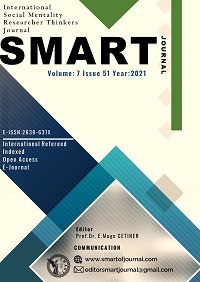Author :
Abstract
Avrupa'yı 19. yüzyılda pençesine alan etnik milliyetçiliklerin çoğunun tersine Arap milliyetçiliği bünyesinde dilsel, ırksal ve kültürel açıdan homojen bir grubun yücelip kendisini gerçekleştirdiği bir devlet idealine yönelik determinist bir yaklaşım içinde gelişmedi. I. Dünya Savaşı sonrası dönemin milliyetçi Arap ideologlarının yoğun çabalarına rağmen, Arap milliyetçiliğinin “Türk boyunduruğuna” ilerici bir meydan okuma, isyan etme ve nihayet kurtuluşa ulaşma şeklinde takdim eden anlatımları gerçeklerle örtüşmemektedir. Arap bilincinin uyanması esasen mütereddit ve müphem meseleydi. Tam da Osmanlı İmparatorluğu'nun sonu yaklaşmaktayken, az sayıda ancak mühim bir Arap grubu tarafından yüzyıllara dayanan eski İmparatorluğu sadakatten ayrı bir Arap kaderi düşüncesi ciddi anlamda gündeme getirilmeye başlandı.
Keywords
Abstract
Contrary to most of the ethnic nationalisms that gripped Europe in the 19th century, Arab nationalism did not develop within a deterministic approach towards the ideal of a state in which a linguistically, racially and culturally homogeneous group would exalt and realize itself. Despite the intense efforts of the nationalist Arab ideologues of the post-World War I era, the narratives of Arab nationalism that presented a progressive challenge to the "Turkish yoke", rebellion and finally achieving liberation do not coincide with the facts. The awakening of the Arab consciousness was essentially a hesitant and ambiguous issue. Just as the end of the Ottoman Empire was approaching, the idea of an Arab destiny separate from the loyalty to the old Empire, which dates back centuries, began to be seriously brought up by a small but important group of Arabs.
Keywords
- George Antonius, The Arap Awakening, Khayat’s College Book Cooperative, Beyrut, 1955
- George Antonius, The Arap Awakening, Khayat’s College Book Cooperative, Beyrut, 1955
- Kayalı, Hasan, Arabs and Young Turks: Ottomanism, Arabism and İslamism in the Ottoman Empire, 1908- 1918, University of California Press, Berkeley, 1997
- N.Zeine, Nashou el-Gavmiye el-Arabiya, edition, Dar el-Alahan, Beyrut, 1986
- Eliezer Touber, The Emergence of the Arab Movements, Routledge, Londra, 1993
- Macid Khadduri, Arap Contempararies; The Role of Personalities in Politics, John Hepkins Univesity Press, Baltimore and London, 1973
- Lord Birdwood, Nuri es-Said, A Study in Arab Leadership, Cassell, Londra, 1959 Amin Sa’id Al Thawra al-Arabiya, al-Kubra, Matba’at Isa al-Babi, Beyrut
- El-Zehrawi, Ahmet Tarabein’n Rashid Khadili et al, New York,1991
- Tawfig al-Suwaidi, Mudhakarati Nusf Garn Min Tarikh al-Irag Wal God Hiya al-Arabiya, al-Mauassasa al- Aribiya lil Tiba’a Wal Nashr Amman, 2010
- Halid M. el Barazi, The Maclis Mebusan, Yayınlanmamış Doktara Tezi, Londra Üniversitesi,2002 Abdullah ibn el-Hüseyin El-Arab dergisi, Sayı:5,Haziran 1971,Ekim 1971
- Rashid Rhalid, The 1912 Election Campaign in the Cities of Bilad al-sham, intenational journal of Middle East studies, C.16, No.4, Kasım 1984
- Jhaw- Ezel Kural Shaw, The History of the Ottoman Empire and Modern Turkey, C.11, Cambridge University Press, Cambridge, 1995
- Kingdom of Irag, Directorate of Public Information As’ad Daghir, Kahire,1973
- Abdullah ibn al Hussein Mudhakkirat, Al-Ahliya lil-Nash Wal Tawzi, Ürdün, Amman,1989
- Mim Kemal Öke, The Ottoman Empire and the Guestion of Palestine, 1888-1908; International Journal of Middle East Studies, Cilt 14, No.3, Ağustos,1982





